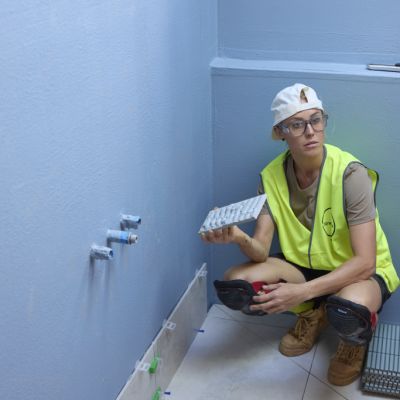Australians are working more hours, and it might be hurting our living standards
Australian workers could be putting in nearly half the hours they were 45 years ago but have instead tended to work longer hours to upgrade their lifestyles, sacrificing work-life balance for more income.
Productivity Commission research economist Rusha Das found average working hours for Australians had shrunk only modestly from about 34 to 31 hours a week over the past few decades, while incomes had risen significantly.

“Overall, Australians have opted to use their [increased productivity] to upgrade their lifestyles, like buying fancier coffee and taking more expensive holidays, rather than shorten their workdays,” Das said in the commission’s June bulletin.
She noted that, with the growth in productivity since 1980, Australians could have instead worked an average of 15 hours less each week without lowering consumption levels.
But given productivity – the amount of goods and services produced for a given level of resources, including hours worked – has stagnated over the past decade, Australians may be compensating by putting in more legwork.
Federal Treasurer Jim Chalmers, who has said productivity is the primary focus of his second term in government, will host a roundtable this month in Canberra with representatives from industry, unions and government to find ways to lift the country’s living standards.
The Australian Manufacturing Workers’ Union and the Australian Nursing and Midwifery Federation have called for shorter working hours and more annual leave in return for productivity gains ahead of the roundtable. AMWU national secretary Steve Murphy told The Australian that “productivity can’t be at the expense of the wellbeing of workers”.
Cronulla real estate agent Domenico Santaguida, 24, works 7am to 6pm on weekdays and 7am to 5pm on Saturdays while fielding calls and questions from buyers and sellers around the clock.
“I’m a commission-only salesman, so I have to be constantly selling to get paid,” he said. “Everyone in the office works pretty long hours, but I don’t have anyone working underneath me, so I’m a bit more hands-on, and it takes a bit more time.”
By contrast, Santaguida said some of his extended family work far fewer hours.
“I have a cousin overseas in Italy who only works three months of the year,” he said. “It’s probably partly a cultural difference, but it’s also not very expensive to live over there, while Sydney has one of the most expensive property markets in the world.”
The latest data from the Australian Bureau of Statistics shows 6.5 per cent of employed people in Australia were juggling jobs in March. And according to the OECD, Australians worked an average of 1645 hours in 2023, or just under 32 hours a week – more than the 26 hours a week worked by Germans and the 31 hours worked in Japan.
Research by Eliza Littleton, a senior economist at the Australia Institute’s Centre for Future Work, found in 2022 that Australian workers put in four hours and 20 minutes of unpaid overtime a week – or about six weeks of unpaid overtime a year. For full-time workers, it was closer to five hours a week.
When it comes to paid overtime, Littleton said Australians often took on more hours than workers in the US, Canada and Britain.
But a raft of major companies have looked at shaking up that trend, including health insurance behemoth Bupa, consumer goods giant Unilever and furniture conglomerate IKEA. They are among the businesses that have trialled, and in some cases adopted, reduced working hours.
Last week, the largest-scale research to date on the four-day workweek, which looked at 3000 employees of 141 companies across six countries over a six-month period, found workers were happier, less burnt out, had higher job satisfaction and improved mental and physical health working fewer days. They remained just as productive.
Unilever finished its almost three-year trial of a four-day workweek in June, saying that while it had provided “invaluable learnings which have enabled us to drive productivity”, the change was too rigid.
“There’s no one-size-fits-all approach to flexibility,” a Unilever spokesperson said, noting the company had replaced the trial with an “everyday flexibility” approach aimed at giving employees “the autonomy to manage their workload in a way that works best for them”.
Bupa started trialling nine-day working fortnights for some teams in November 2023. The company said the outcome was not a reflection on the success of the trial, despite discontinuing the work arrangements last month.
“Our people responded positively to the pilot, and we saw improvements in areas we were monitoring, including productivity, engagement and retention, wellbeing and flexibility,” a Bupa spokesperson said.
But they said the trial highlighted the importance of ensuring adequate team coverage when people used flexible working arrangements to ensure there were no gaps in dealing with customers and service delivery.
IKEA Australia’s co-worker experience manager, Greg Day, said the option to request a four-day workweek, which was included in the company’s most recent enterprise agreement, gave the company a competitive edge.
“We have shifts available in our stores across most hours of the day, seven days per week,” Day said. “That makes IKEA an attractive employer to join, and one to stay with through different life stages when flexibility around working hours and days is important.”
Gerard Dwyer, national secretary of the SDA, the union for retail, fast food, warehouse and online retail workers, said higher annual leave provisions and four-day work weeks could boost productivity.
“Where applied equitably, as is the case at IKEA, it contributes to a healthier work-life balance as well as a more efficient and effective workplace,” Dwyer said.
While Australians’ average incomes had generally continued to grow over the past few decades, Australia ranked relatively poorly when it came to work-life balance, according to the OECD, trailing most other Western countries.
Santaguida said his social life had taken a hit, and he would like to wind back his working hours in a few years’ time to travel. He said that, for now, he is eager to make more money. “I still want to get to that next level, doing a million dollars a year in commission,” he said.
We recommend
States
Capital Cities
Capital Cities - Rentals
Popular Areas
Allhomes
More










